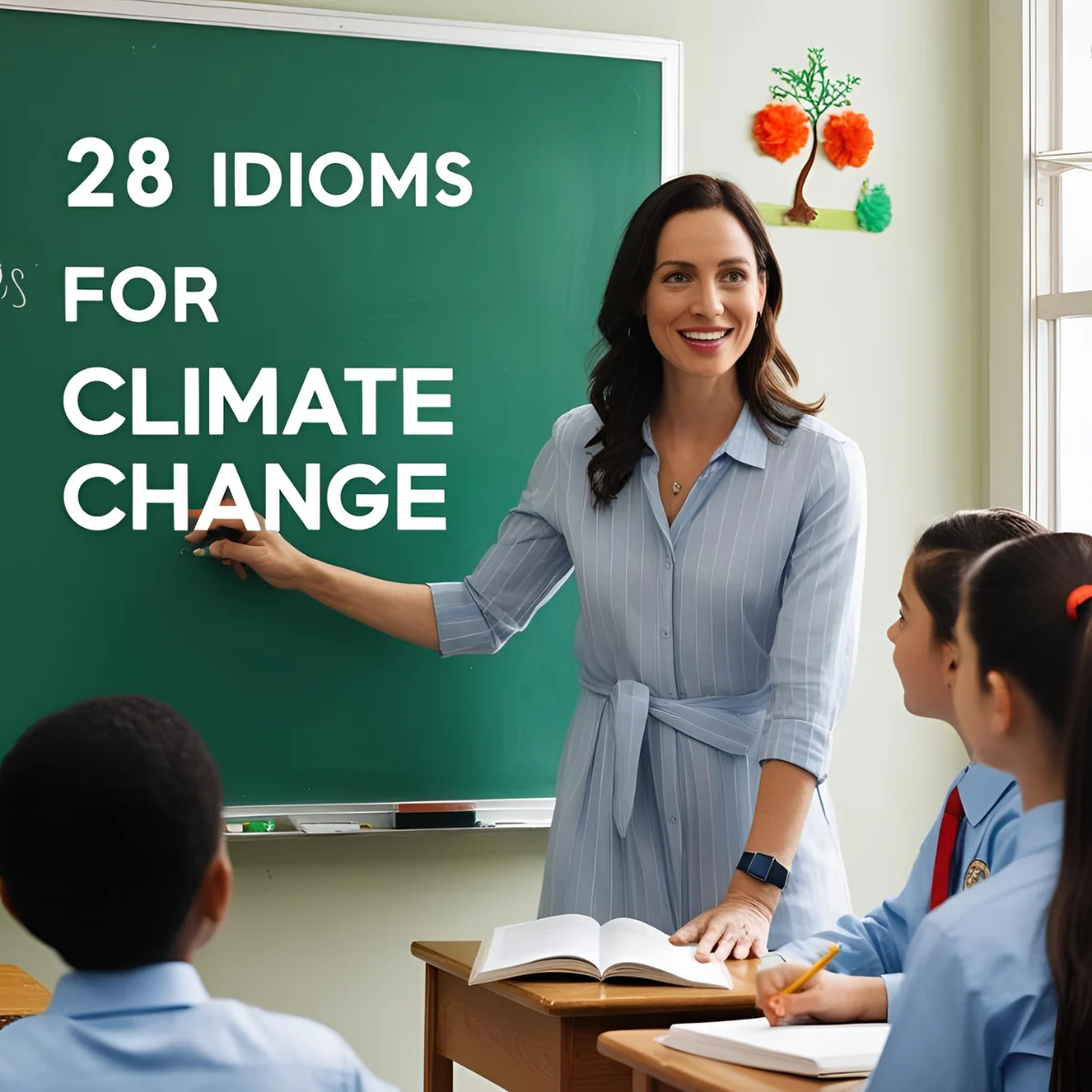As climate change becomes one of the most urgent global challenges, the language we use to discuss it is evolving too. Idioms help express complex environmental issues in a more relatable and powerful way.
From “the tip of the iceberg” to “under the weather,” many common phrases can describe environmental shifts, human impact, or rising concerns metaphorically.
Understanding these idioms can enhance communication in education, activism, and media. In this article, we’ll explore 28 idioms that relate to climate change—complete with meanings and real-world examples.
1. The Tip of the Iceberg
Meaning: A small part of a much bigger problem.
Example: “The recent heatwave is just the tip of the iceberg when it comes to climate change.”
Tone: Cautionary, serious.
Other ways to say it: Just the beginning, the surface level.
2. Under the Weather
Meaning: Feeling unwell, often due to environmental conditions.
Example: “With the air pollution worsening, many people are feeling under the weather.”
Tone: Concerned, descriptive.
Other ways to say it: Feeling sick, out of sorts.
3. A Perfect Storm
Meaning: A combination of factors leading to disaster.
Example: “Deforestation, pollution, and rising temperatures have created a perfect storm for climate change.”
Tone: Alarming, urgent.
Other ways to say it: Worst-case scenario, major crisis.
4. Blow Hot and Cold
Meaning: To change opinions frequently.
Example: “Some governments blow hot and cold on climate policies, causing delays in action.”
Tone: Frustrated, critical.
Other ways to say it: Be indecisive, flip-flop.
5. Come Rain or Shine
Meaning: No matter the circumstances.
Example: “Environmental activists continue their work, come rain or shine.”
Tone: Determined, steadfast.
Other ways to say it: No matter what, against all odds.
6. The Calm Before the Storm
Meaning: A quiet period before chaos.
Example: “The unusually warm winter felt like the calm before the storm of extreme weather.”
Tone: Ominous, warning.
Other ways to say it: Before disaster strikes, deceptive peace.
7. Every Cloud Has a Silver Lining
Meaning: There is some good in every bad situation.
Example: “While climate change is a crisis, its silver lining is that more people are taking action.”
Tone: Hopeful, optimistic.
Other ways to say it: Finding the good, making the best of it.
8. Go Against the Tide
Meaning: To do something different from the majority.
Example: “Sustainable businesses are going against the tide of mass consumption.”
Tone: Encouraging, rebellious.
Other ways to say it: Swim upstream, stand against the crowd.
9. The Winds of Change
Meaning: Signs that change is coming.
Example: “The rise in renewable energy use shows the winds of change in our fight against climate change.”
Tone: Motivating, forward-looking.
Other ways to say it: A shift is happening, change is coming.
10. A Drop in the Ocean
Meaning: A very small effort in comparison to what is needed.
Example: “One person recycling is a drop in the ocean, but collective action makes a difference.”
Tone: Realistic, challenging.
Other ways to say it: A tiny effort, a small step.
11. Make Waves
Meaning: To cause change or impact.
Example: “The youth climate movement is making waves worldwide.”
Tone: Inspiring, action-driven.
Other ways to say it: Shake things up, make an impact.
12. Save for a Rainy Day
Meaning: To prepare for future difficulties.
Example: “Investing in green technology is like saving for a rainy day.”
Tone: Practical, forward-thinking.
Other ways to say it: Plan ahead, be prepared.
13. Storm in a Teacup
Meaning: A big fuss over a small issue.
Example: “Some people think climate change is just a storm in a teacup, but the evidence says otherwise.”
Tone: Critical, serious.
Other ways to say it: Overreaction, unnecessary panic.
14. Be in Deep Water
Meaning: To be in serious trouble.
Example: “If we don’t reduce carbon emissions, we’ll be in deep water soon.”
Tone: Urgent, serious.
Other ways to say it: In a crisis, in serious trouble.
15. Weather the Storm
Meaning: To endure a difficult situation.
Example: “Communities affected by wildfires have to weather the storm of rebuilding their lives.”
Tone: Resilient, hopeful.
Other ways to say it: Get through tough times, survive the challenge.
16. Boiling Point
Meaning: A critical or dangerous level.
Example: “Climate change has reached its boiling point, and we must act now.”
Tone: Urgent, alarming.
Other ways to say it: Crisis point, breaking point.
17. Turn Up the Heat
Meaning: To increase pressure or urgency.
Example: “Scientists are turning up the heat on policymakers to take action.”
Tone: Forceful, pressing.
Other ways to say it: Apply pressure, intensify the situation.
18. Walking on Thin Ice
Meaning: Being in a risky or dangerous situation.
Example: “Ignoring climate change means we’re walking on thin ice.”
Tone: Warning, cautious.
Other ways to say it: Taking risks, in a delicate situation.
19. Fan the Flames
Meaning: To make a situation worse.
Example: “Deforestation fans the flames of global warming.”
Tone: Critical, serious.
Other ways to say it: Make worse, intensify the problem.
20. Out of the Woods
Meaning: Free from danger.
Example: “Even with emission cuts, we are not out of the woods yet.”
Tone: Realistic, cautious.
Other ways to say it: Not safe yet, still at risk.
21. The Sky’s the Limit
Meaning: No limits to what can be achieved.
Example: “With innovation, the sky’s the limit for clean energy solutions.”
Tone: Encouraging, optimistic.
Other ways to say it: Endless possibilities, no boundaries.
22. Can’t See the Forest for the Trees
Meaning: Focusing too much on details and missing the bigger picture.
Example: “Some people debate minor points but can’t see the forest for the trees on climate change.”
Tone: Critical, insightful.
Other ways to say it: Missing the big picture, too focused on details.
23. When It Rains, It Pours
Meaning: Problems often come all at once.
Example: “As temperatures rise, we’re seeing more floods—when it rains, it pours.”
Tone: Inevitable, realistic.
Other ways to say it: One problem leads to another, bad things come together.
24. A Green Thumb
Meaning: A talent for gardening or environmental care.
Example: “More people are developing a green thumb by planting trees and gardens.”
Tone: Positive, inspiring.
Other ways to say it: Eco-friendly, nature lover.
25. Throw Caution to the Wind
Meaning: To act recklessly.
Example: “Ignoring climate warnings is like throwing caution to the wind.”
Tone: Warning, critical.
Other ways to say it: Be careless, take unnecessary risks.
26. On Thin Air
Meaning: Based on nothing or unstable.
Example: “Denying climate change is like standing on thin air.”
Tone: Skeptical, factual.
Other ways to say it: Without foundation, unsupported.
27. A Ray of Sunshine
Meaning: A sign of hope.
Example: “Renewable energy is a ray of sunshine in the fight against climate change.”
Tone: Hopeful, positive.
Other ways to say it: Bright spot, good news.
28. Cool as a Cucumber
Meaning: Staying calm under pressure.
Example: “Scientists remain cool as a cucumber as they search for climate solutions.”
Tone: Calm, collected.
Other ways to say it: Stay composed, handle pressure well.
Conclusion
Using idioms to talk about climate change brings depth, emotion, and clarity to this critical topic. These 28 expressions offer a creative way to raise awareness, explain consequences, and emphasize the urgency of action.
Whether you’re describing a “meltdown” or a “perfect storm,” idioms help people connect with environmental messages on a more personal level. Practice these phrases to make your writing and speech more impactful—and to help spark meaningful conversations about the planet’s future.



